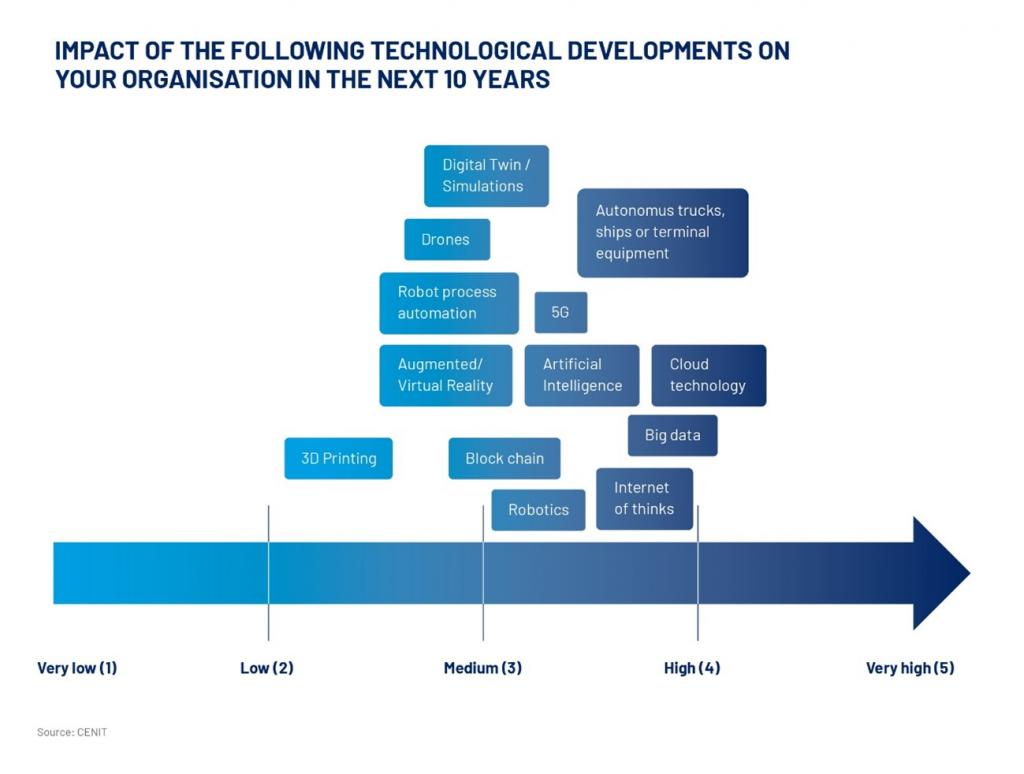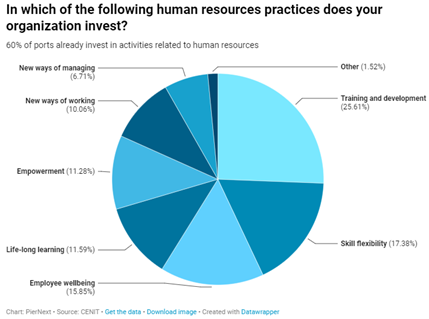YEP MED as a tool to prepare human capital in the Mediterranean ports of the future

YEP MED as a tool to prepare human capital in the Mediterranean ports of the future
Major changes are on the horizon in the labour market due to the consolidation of ICTs. Training will be essential to acquire new skills. (GettyImages)
THE TECHNOLOGICAL AND INDUSTRIAL CHALLENGES THE MARITIME CLUSTER AND LOGISTICS ARE FACING
The labor market faces major changes in the horizon due to the consolidation of information and communication technologies (ICT), the cloud, automation, augmented reality (AR), Artificial Intelligence (AI), Blockchain and big data analytics. But according to a study carried out about the port of Antwerp, the maritime cluster and the logistics sector are lagging behind in the introduction of ICT compared to other sectors. However, the ports are already looking for answers to reduce this sectoral gap.
To go into detail on the impact on the human capital of the often-disruptive technological development in ports, the Port of Barcelona has carried several studies at a local and international level to detect the urgent and future needs of the port community in terms of talent acquisition. One of these studies has been performed in the framework of the YEP MED project at a local level, under the name of Study of professional profiles in the Port Logistic Community of Barcelona.
At an international scenario, we look at the study carried out by the Center For Innovation in Transport (CENIT) on the basis of a survey distributed to the port communities of New York/New Jersey, Los Angeles, the Italian Ports Association, Sohar, Rotterdam, Gdansk and Barcelona.
This study has been promoted by the Port Authority of Barcelona, which in its 4th Strategic Master Plan (2021-2025) identified social sustainability as a key strategic pillar, with the objective of having 40,000 workers in the port by 2025 a 4% more than the current number .
THE KEY TECHNOLOGIES FOR THE NEXT DECADE
The main technological developments expected over the next 10 years, according to the organisations surveyed in this CENIT study promoted by the Port of Barcelona, are the following:
(SOURCE: CENIT)
As it can be seen from the figure above, most ports think that the technologies that will generate the greatest impact are wireless and those in charge of managing data. Big Data, cloud technology and the Internet of Things are key to collecting relevant information on their activity and to guarantee the traceability of goods, documents or vehicles, among other trends.
SPECIALIZATION, THE BEST SOLUTION
According to the results of the survey, the port community believes that specialized vocational training in the sector would be necessary. Training is essential in almost all organizations, as each company has its own policies and processes that employees must follow. Critically, there is a shortage of professionals in the operations area with industry knowledge and other skills to lead the way in the future.
To mitigate these impacts, projects such as YEP MED are initiating major actions to develop solutions to today's major challenges, such as the need for digitalization or global warming.
The YEP MED project has identified the need for digitalization in the port-logistics sector and has developed a digital platform to simulate international and transport operations and train the future professionals with a digital perspective.
Skill development, automation of human-intensive processes, re-skilling of the existing workforce, availability of talent locally are key programmes for the maritime sector organizations. And they must ensure that their teams are ready for the arrival of the fourth industrial revolution.
INVESTING IN SKILLS IS KEY IN THE LOGISTICS AND MARITIME SECTOR
To achieve this, organizations need to invest. In particular, 60% are already investing in human resources activities, as shown in the graph below:

(SOURCE: Chart PierNext - DATA: CENIT)
In terms of the most in-demand skills, the ports agree that the ability to work in a team is currently the most important one.
This is followed by interpersonal skills (negotiation, collaboration, communication), intrapersonal skills (self-management, flexibility) and multi-skills (proficiency in multiple skill areas). All of them are related to working group activities which are relevant for the organizations.
TRAINING ADAPTED TO THE SECTOR’S NEEDS
The training provided is fundamental to achieving new standards in the maritime sector. However, organizations agree that some skills are not taught particularly well and that new recruits are not adequately prepared in some skills.
Therefore, according to the organizations, educational institutions should:
- Give more prominence to practical and work experience during academic training.
- Increase the number of technical skills (e.g. digital and computer skills).
- Strengthen the ability to form teams by organizing more working groups that foster the development of multiple skills.
The YEP MED project focuses its training in enhancing these special needs of training offering practical training by experiencing real working in simulated companies, covering the technical aspects included in the digitalization of the international trade environment by using an ERP software (Enterprise Resource Planning), and making the students work in groups to find solutions to the international operations that they need to work on.
As the CENIT study reflects, technologies will inevitably impact on the productivity, efficiency and organization of ports. At the same time, the port and educational community must draw up a joint strategy to meet the needs of the sector in terms of training for these new profiles. Although everything indicates that the workforce of the future will be more technological, the greatest capital of the ports will continue to be human.









